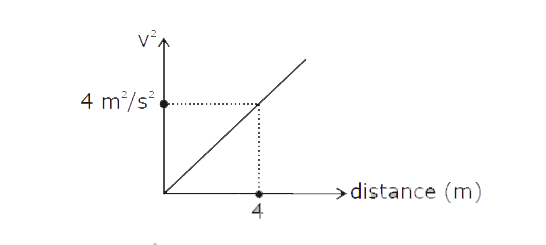In a case of a motion, displacement is directly proportional to the square of the time elapsed. What do you think about its acceleration i.e., constant or variable ? Explain why ?
Step by step video & image solution for In a case of a motion, displacement is directly proportional to the square of the time elapsed. What do you think about its acceleration i.e., constant or variable ? Explain why ? by Physics experts to help you in doubts & scoring excellent marks in Class 11 exams.
Updated on:21/07/2023Topper's Solved these Questions
Similar Questions
In a case of a motion, displacement is directly proportional to the square of the time elapsed. What do you think about its acceleration i.e., constant or varianle ? Explain why ?
View SolutionThe displacement of a body is proportional to t3, where t is time elapsed. What is the nature of acceleration - time graph of the body?
View Solution
Knowledge Check
Read the given statements and select the correct option.
Statement 1: When the displacement of a body is directly proportional to the square of the time, then the body is moving with uniform acceleration.
Statement 2 : The slope of velocity-time graph with time axis gives acceleration.ABoth statements 1 and 2 are true and statement 2 is the correct explanation of statement 1.BBoth statements 1 and 2 are true but statement 2 is not the correct explanation of statement 1.CStatement 1 is true but statement 2 is false.DStatement 1 is false but statement 2 is true.A body travels such that square of time is proportional to the displacement. Its acceleration is:
AzeroBinfiniteCconstantDvariableA particle is moving on a straight line such that square of its velocity is directly proportional to distance as shown in graph. What is the acceleration of the particle ?
 A14m/s2B1m/s2C2m/s2D12m/s2
A14m/s2B1m/s2C2m/s2D12m/s2
The velocity of a particle moving in a straight line is directly proportional to 3/4th power of time elapsed. How does its displacement and acceleration depend on time?
View SolutionShow that for a particle in linear simple harmaonic motion, the acceleration is directly proportional to its displacement of the given instant.
View SolutionShow that in simple harmonic motion (S.H.M.), the acceleration is directly proportional to its displacement at the given instant.
View SolutionTime period (T) of pedulum is directly proprortional to the square root of length of string by which bob is attached to a fixed point and iknversely proportional to the square root of gravitational constant g. Time period of a bob is 3 seconds when the gravitational constannt g is 4m/sec2 and length of string is 9 metre, what is the time period of a bob having astring of length 64 metre and gravitational constant 16m/sec2?
View SolutionTime period (T) of pendulum is directly proportional to the square root of length of string by which bob is attached to a fixed point and inversely proportional to the square root of gravitational constant 'g'. Time period of a bob is 3 seconds when the gravitational constant g is 4 msec2 and length of string is 9 metre, what is the time period of a bob having a string length of 64 metre and gravitational constant g is 16 msec2?
View Solution
